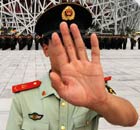The Chinese army moved in at the Main Press Center in Beijing today,  with a heavily armed armoured personnel carrier parked outside the entrance, while journalists were also subjected to body and baggage checks to enter their accommodation.
with a heavily armed armoured personnel carrier parked outside the entrance, while journalists were also subjected to body and baggage checks to enter their accommodation.
Yet no one from BOCOG, the Beijing organising committee, nor the IOC was able to explain whether the measures had been the result of an increased threat against the media.
Security checks have also been raised at the Athletes’ Village, with reports of heavily armed special forces troops being deployed there.
“It’s meant to be protective. To safeguard the security of the athletes and everybody,†Wang Wei, vice president of BOCOG, said at a daily briefing.
“I’ve seen those kind of things in other Games.â€
Visible security was already tight in Beijing – as it is at all post-1972 Olympics – from tall metal mesh fences and military guards ringing venues to the scan-and-search stations at entries. In common with recent airport security measures, people carrying bottled drinks have also been requested to drink from the bottle before being permitted access to Olympic sites.
Tonight, journalists returning home to the Huiyan and North Star Media Villages had to go through an additional airport-style security check when they disembarked from the fleet of media buses from the MPC or venues. Previously, an electronic check-in with their accreditation cards was sufficient.
The military vehicle at the MPC is equipped with a small calibre cannon and machine guns. Similar APCs have been reported today near the Bird’s Nest stadium and Water Cube aquatics centre. It is the sort of vehicle which the Chinese army deployed in 1989 to suppress freedom demonstrations in Tiananman Square. This time, though, some suggest that the deployment may be based on military intelligence regarding terrorist threats against the Games.
However, Wang said he did not even know a military vehicle was parked in front of the MPC.
“With regard to the previous stabbing incident, I think the relevant authorities may have increased the security level. The point is that they should not, well, create a negative effect to the access. They should not present an inconvenience for the media, I think that is the point.
“So if that’s a reassurance, I think that is a good thing.â€
The security clampdown follows criticism of the organisers using goose-stepping troops to carry the Olympic flag at the Opening Ceremony last Friday and also comes in the face of criticism by IOC members over the way China is implementing security.
The lack of atmosphere around Olympic sites was because of the tension created by security, according to John Coates, president of the Australian Olympic Committee. “They haven’t been able to manage the balance between security and creating that atmosphere I suppose,” Coates said.
“We can’t have it like this,” Gerhard Heiberg, of Norway, told Aftenpost newspaper.
“The Chinese are scaring the wits out of foreigners. When they have weapons and look scary, it is even worse.”
â–¡ Human rights groups claim that the authorities in China have tightened restrictions on dissidents since the Games began.
Amnesty International says authorities have locked up, put under house arrest or forcibly moved individuals they believed may have threatened the image of “stability” and “harmony” China wanted to present.
Security agents on Sunday reportedly detained a Christian activist on his way to a church service attended by US President George W Bush.
Click here to read previous Beijing Blog entries from Barry Newcombe
Join the SJA today – click here for details and membership application form